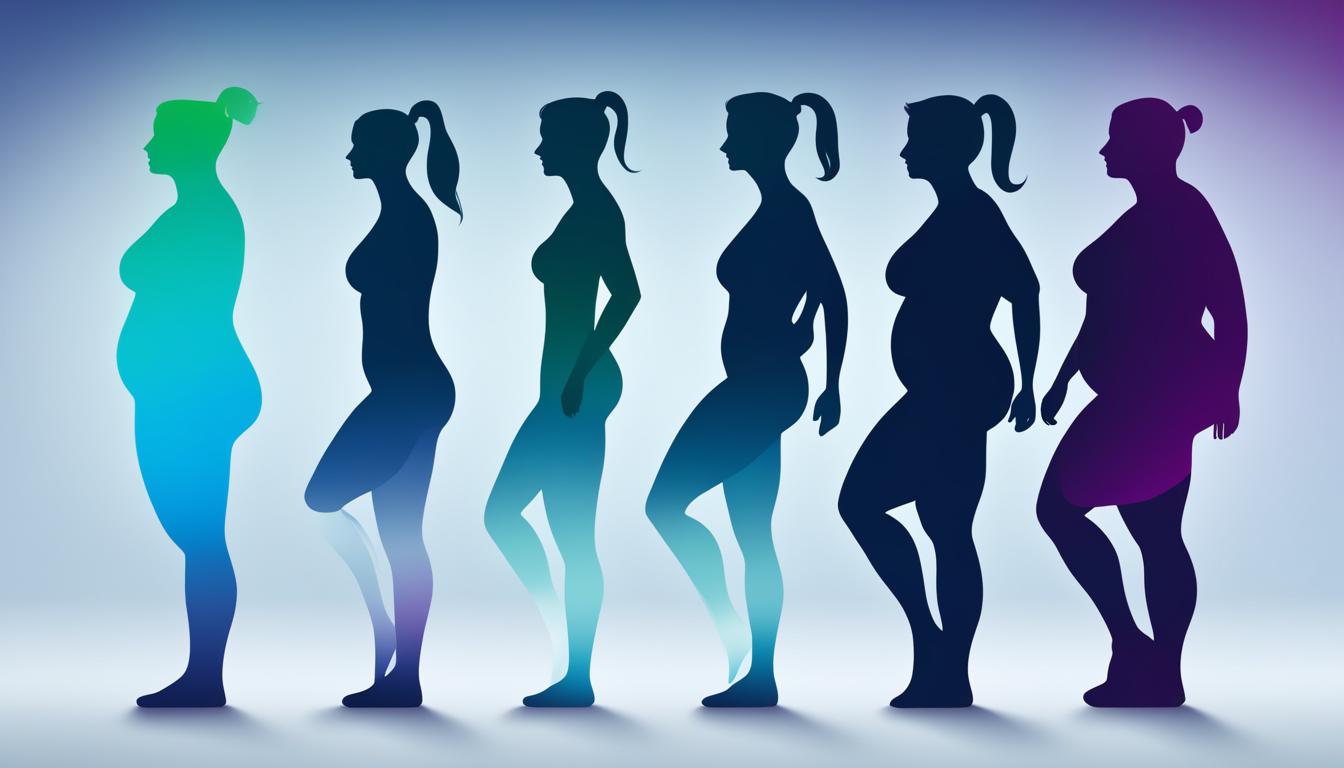Did you realize that more than 70% of adults in the United States are overweight or obese? With sedentary lifestyles and desk jobs becoming more prevalent, many people find it difficult to lose weight and stay at a healthy weight. Fortunately, there are plenty of strategies and tips available to assist in weight loss and help you on your journey to slimming down.
Key Takeaways:
- Incorporate physical activity into your daily routine to boost weight loss and improve overall health.
- Make healthier food choices, focusing on a balanced diet that includes nutrient-dense foods.
- Practice mindful eating and portion control to avoid overindulging and manage emotional eating.
- Consider time-restricted eating or intermittent fasting as an effective strategy to enhance weight loss results.
- Seek support from online communities, educational resources, and healthcare professionals to stay motivated and accountable.
The Impact of a Desk Job on Weight Gain.
Having a desk job can have a significant impact on your weight and overall health. The sedentary nature of office work, combined with poor nutrition choices, can lead to weight gain and potential health issues.
Studies have shown that individuals with desk jobs often have long commutes, spending hours sitting in their cars or on public transportation. This lack of physical activity can contribute to weight gain and a higher body mass index (BMI). In contrast, opting for alternative commuting methods such as walking or using public transportation has been associated with lower BMI and improved health.
Moreover, the act of sitting for long periods of time can slow down your metabolism and contribute to weight gain. When you sit for extended periods, your body burns fewer calories compared to being active. This can lead to an energy imbalance, where you consume more calories than you burn, resulting in weight gain over time.
Poor nutrition choices also play a significant role in weight gain for individuals with desk jobs. It’s common for professionals to rely on quick and unhealthy food options such as fast food, vending machine snacks, or skipping meals altogether due to busy work schedules. These choices often lack essential nutrients and are higher in calories, leading to weight gain and a negative impact on health.
For weight loss and overall well-being, it’s crucial to be aware of the impact your desk job can have on your body. By making conscious choices to incorporate physical activity into your daily routine, such as taking short breaks to stretch, walking or biking during lunch breaks, or using a standing desk, you can counteract the sedentary nature of your job and support weight loss.
| Factors | Impact |
|---|---|
| Long Commutes | Higher BMI and increased weight gain |
| Sitting for Long Hours | Slowed metabolism and higher risk of weight gain |
| Poor Nutrition | Unhealthy food choices and increased calorie intake |
Being mindful of your nutrition choices is equally important. Packing a nutritious lunch and snacks from home, incorporating fruits and vegetables into your meals, and staying hydrated can ensure you’re nourishing your body properly while at work.
To combat the impact of a desk job on weight gain, it’s essential to prioritize movement and balanced nutrition. Small changes, such as taking regular breaks to move, opting for healthier food options, and finding ways to incorporate physical activity into your day, can make a significant difference in managing your weight and improving your overall health.
The Role of Stress and Sleep in Weight Gain.
When it comes to weight gain, stress and sleep play a significant role in disrupting our body’s natural balance. In the hustle and bustle of demanding jobs, many people find themselves turning to inactive activities like watching TV or lazing on the couch to cope with stress. However, these sedentary behaviors can have detrimental effects on our weight.
Stress can lead to weight gain in several ways. Firstly, when we’re stressed, our bodies release the hormone cortisol, which can increase our appetite and drive us to consume more calories. Additionally, stress can lead to emotional eating, causing us to reach for unhealthy comfort foods that are high in calories and low in nutritional value.
“Stress can lead to emotional eating, causing us to reach for unhealthy comfort foods that are high in calories and low in nutritional value.”
Moreover, stress can disrupt our sleep patterns, further exacerbating the issue. Lack of sleep has been linked to an increase in ghrelin, the hormone responsible for appetite regulation. This means that when we’re sleep-deprived, we may experience stronger hunger cravings, particularly for high-calorie foods and snacks.
To compound the problem, irregular sleep patterns or eating late dinners can also affect our metabolism and contribute to weight gain. When we eat late at night, our bodies have less time to digest the food properly, leading to slower metabolism and increased storage of fat.
Managing stress and prioritizing sleep are crucial for supporting weight loss efforts. Finding healthy ways to cope with stress, such as exercise, meditation, or engaging in hobbies, can help reduce cortisol levels and minimize the temptation to turn to unhealthy comfort foods.
Creating a bedtime routine that promotes restful sleep is equally important. Establishing a consistent sleep schedule, creating a relaxing environment in your bedroom, and avoiding stimulating activities before bed can help improve sleep quality and regulate appetite hormones.
By managing stress, prioritizing sleep, and maintaining a regular eating schedule, you can support your weight loss goals and achieve a healthier lifestyle overall.
Strategies to Manage Stress and Improve Sleep
| Stress Management | Sleep Improvement |
|---|---|
| Exercise regularly to release endorphins and reduce stress levels | Establish a consistent sleep schedule |
| Practice relaxation techniques like meditation or deep breathing | Create a calming sleep environment by keeping your bedroom dark, quiet, and cool |
| Engage in hobbies or activities that bring you joy and help you unwind | Avoid electronic devices and stimulating activities before bedtime |
| Seek support from friends, family, or a therapist to help manage stress | Limit caffeine intake, especially in the afternoon and evening |
Remember, achieving and maintaining a healthy weight goes beyond just diet and exercise. Taking care of your mental well-being and ensuring adequate sleep are essential pieces of the puzzle.

The Importance of Physical Activity.
To achieve successful weight loss, incorporating physical activity into your daily routine is essential. Engaging in regular exercise, going for walks, taking the stairs instead of the elevator, and incorporating various forms of physical activity can be incredibly beneficial for burning calories and supporting your weight loss goals.
Physical activity not only aids in weight loss but also has numerous positive effects on your overall health and mental well-being. It helps improve cardiovascular fitness, strengthens muscles, enhances flexibility, and boosts your energy levels, allowing you to lead a more active and fulfilling life.
There are several ways to include physical activity in your daily routine. If you enjoy structured workouts, consider joining a gym, attending fitness classes, or working with a personal trainer. These options provide guidance, accountability, and a variety of exercise options tailored to your fitness level and goals.
For those who prefer a more independent approach, you can engage in activities like jogging, cycling, swimming, or practicing yoga at home or in a nearby park. These activities not only burn calories but also offer an opportunity to enjoy the outdoors and connect with nature.
Here are some additional ideas to help you incorporate physical activity into your daily life:
- Take a brisk walk during your lunch break
- Use a standing desk or adjustable desk converter to alternate between sitting and standing throughout the day
- Participate in group sports or recreational activities like basketball, soccer, or tennis
- Plan active outings with friends and family, such as hiking, biking, or rollerblading
- Find opportunities to incorporate physical activity into your daily chores, such as gardening, cleaning, or DIY projects
Remember, consistency is key. Aim for at least 150 minutes of moderate-intensity aerobic activity or 75 minutes of vigorous-intensity aerobic activity per week, along with strength training exercises at least twice a week to reap the full benefits of physical activity on weight loss and overall health.
As you embark on your weight loss journey, stay motivated and track your progress to see how physical activity contributes to your goals. Remember, every step counts, and each workout brings you closer to a healthier and happier version of yourself.

| Benefits of Physical Activity for Weight Loss | Impact on Health and Well-being |
|---|---|
| Burns calories and aids weight loss | Improves cardiovascular fitness and lowers the risk of heart disease |
| Increases muscle strength and endurance | Boosts mood and reduces symptoms of depression and anxiety |
| Enhances flexibility and joint mobility | Improves sleep quality and helps manage stress levels |
| Reduces the risk of chronic diseases like type 2 diabetes and certain cancers | Improves overall energy levels and increases productivity |
The Role of Nutrition in Weight Loss.
When it comes to achieving weight loss goals, the role of nutrition cannot be overstated. The food choices you make at work can significantly impact your journey towards a healthier weight. By focusing on a well-balanced diet that incorporates nutrient-dense foods, you can support weight loss and enhance your overall health.
To start, prioritize incorporating plenty of fruits and vegetables into your meals. These nutrient-packed foods not only provide essential vitamins and minerals but also contribute to feelings of fullness, helping to curb cravings and prevent overeating. Additionally, lean proteins, such as chicken, fish, tofu, and beans, can help build and repair muscle while keeping you satisfied.

Choosing whole grains instead of refined grains can also have a positive impact on your weight loss efforts. Whole grains are rich in fiber, which aids digestion and promotes feelings of fullness. They also provide essential nutrients and help stabilize blood sugar levels, keeping energy levels steady throughout the day.
Avoiding processed and high-calorie foods is another key aspect of a weight loss-friendly diet. These foods are often low in nutrients and high in unhealthy fats, sugars, and sodium, contributing to weight gain and increasing the risk of chronic diseases. Opt for healthier alternatives instead, such as homemade meals and snacks prepared with fresh, whole ingredients.
Incorporating portion control is also crucial for managing your calorie intake. It’s easy to unknowingly consume more calories than you need, especially when indulging in office treats or dining out. Pay attention to serving sizes and listen to your body’s hunger and fullness cues to avoid overeating.
Sample Table: Nutrient-Dense Foods for Weight Loss
| Food Group | Examples |
|---|---|
| Fruits | Apples, oranges, berries, bananas |
| Vegetables | Broccoli, spinach, carrots, peppers |
| Proteins | Chicken breast, salmon, tofu, lentils |
| Whole Grains | Quinoa, brown rice, oats, whole wheat bread |
| Dairy or Alternatives | Greek yogurt, almond milk, cottage cheese |
| Healthy Fats | Avocado, nuts, seeds, olive oil |
Making thoughtful nutrition choices at work plays a vital role in abetting weight loss. By incorporating nutrient-dense foods, avoiding processed options, and practicing portion control, you can optimize your diet for weight loss success. Remember, small changes in your nutrition habits can lead to significant results over time.
The Benefits of Time-Restricted Eating and Intermittent Fasting.
When it comes to weight loss, incorporating time-restricted eating and intermittent fasting into your routine can be highly beneficial. These eating patterns have gained popularity in recent years due to their potential to promote weight loss and improve overall health.
Time-restricted eating involves limiting the window of time in which you consume calories each day. For example, you may choose to eat all your meals within an 8-hour window, such as from 12 PM to 8 PM, and fast for the remaining 16 hours. This approach allows your body to enter a fasting state and burn stored fat for energy, facilitating weight loss.
Intermittent fasting takes this concept a step further by implementing longer periods of fasting. There are several intermittent fasting methods, such as the 16:8 method, where you fast for 16 hours and consume all your calories within an 8-hour window. Other popular methods include the 5:2 method, where you eat normally for 5 days and restrict your calorie intake to 500-600 calories for 2 non-consecutive days of the week.
Research suggests that time-restricted eating and intermittent fasting can help regulate insulin levels, improve metabolic health, and promote fat loss. These eating patterns have also been found to have benefits beyond weight loss, such as reducing inflammation, improving brain health, and increasing lifespan.
To make the most of time-restricted eating and intermittent fasting for weight loss, it’s important to combine them with a nutrient-dense diet. Focus on consuming whole foods, such as fruits, vegetables, lean proteins, and whole grains, during your eating window. Avoid overindulging in processed foods, sugary snacks, and unhealthy fats.
It’s worth noting that time-restricted eating and intermittent fasting may not be suitable for everyone. If you have any underlying health conditions or concerns, it’s best to consult with a healthcare professional before incorporating these eating patterns into your routine.
Benefits of Time-Restricted Eating and Intermittent Fasting:
- Promotes weight loss
- Improves insulin sensitivity
- Enhances metabolic health
- Increases fat burning
- Reduces inflammation
- Supports brain health
- May increase lifespan
Overall, time-restricted eating and intermittent fasting can be effective tools in your weight loss journey. By incorporating these eating patterns and maintaining a nutrient-dense diet, you can optimize your results and achieve your weight loss goals.
| Eating Pattern | Description | Example Time Window |
|---|---|---|
| Time-Restricted Eating | Limiting the window of time in which you consume calories each day | 12 PM – 8 PM |
| 16:8 Intermittent Fasting | 16 hours of fasting, 8 hours of eating | Fast from 8 PM – 12 PM, eat from 12 PM – 8 PM |
| 5:2 Intermittent Fasting | 5 days of normal eating, 2 days of restricted calorie intake (500-600 calories) | Normal eating for 5 days, restricted calorie intake for 2 non-consecutive days |

The Importance of Mindfulness and Mindset.
Cultivating mindfulness and having a positive mindset are integral components of a successful weight loss journey. By being present and aware of your food choices, practicing portion control, and managing emotional eating, you can make healthier choices that align with your weight loss goals.
Start by embracing the concept of mindfulness when it comes to eating. Take the time to fully engage your senses and savor each bite. Pay attention to the flavors, textures, and smells of your food. This allows you to become more attuned to your body’s hunger and fullness cues, preventing overeating and promoting a healthier relationship with food.
“Mindfulness is the key to unlocking a healthier, more balanced way of eating. By being present in the moment and fully experiencing our meals, we can make choices that nourish our bodies and support our weight loss goals.”
Developing a positive mindset is equally important in your weight loss journey. Instead of focusing on short-term results or quick fixes, cultivate a mindset focused on long-term health and sustainable weight loss. Recognize that true transformation takes time and effort, and be patient with yourself along the way.
Incorporate affirmations and positive self-talk into your daily routine. Remind yourself of your goals and the reasons why you want to lose weight. Visualize yourself achieving your desired outcomes and embrace the belief that you have the power to make it happen.
The Benefits of Mindfulness and Mindset
Practicing mindfulness and maintaining a positive mindset offer numerous benefits beyond weight loss. When you approach your weight loss journey with a focused and balanced mindset, you are more likely to:
- Stay motivated and committed to your goals
- Overcome obstacles and setbacks
- Adopt healthier lifestyle habits
- Reduce stress and emotional eating
- Foster a healthier relationship with food
- Experience improved overall well-being
By incorporating mindfulness and mindset into your weight loss journey, you are setting yourself up for long-term success. Remember, it’s not just about the number on the scale, but also about the positive changes you make in your mindset and relationship with food.

Continue to nurture your mindfulness practice and maintain a positive mindset as you progress on your weight loss journey. Celebrate your achievements, no matter how small, and embrace the power of self-compassion. With mindfulness and a positive mindset by your side, you can achieve your weight loss goals and experience lasting health and well-being.
The Role of Supplements and Additional Support.
While supplements alone cannot guarantee weight loss, they can be used as part of a comprehensive approach to support your weight loss journey. Incorporating weight loss supplements into your routine can provide additional support by supplying essential nutrients and promoting optimal metabolic function.
When considering weight loss supplements, it’s important to choose products that are safe and effective. Look for supplements that have been tested and approved by reputable regulatory bodies such as the Food and Drug Administration (FDA). Consulting with a healthcare professional before starting any new supplement regimen is also recommended, as they can provide personalized guidance based on your individual needs and health status.
In addition to weight loss supplements, seeking additional support from various resources can be beneficial. Online communities dedicated to weight loss offer a supportive environment where you can connect with like-minded individuals, share experiences, and gain motivation. Educational resources such as books, articles, and reputable websites provide valuable information on nutrition, exercise, and other strategies for weight loss.
Professional guidance from healthcare providers, nutritionists, or personal trainers can also provide expert advice and guidance tailored to your specific needs. They can help you establish realistic goals, create personalized meal plans and exercise routines, and monitor your progress.
Remember, weight loss supplements and additional support are tools that can support your journey, but they should be used in conjunction with other lifestyle changes such as a balanced diet and regular exercise. There is no magic pill for weight loss, but with the right approach and support, you can achieve your goals.
Supplement Options for Weight Loss
| Supplement | Description |
|---|---|
| Forskolin | A natural plant extract that may help increase metabolism and support fat burning. |
| Green Tea Extract | Packed with antioxidants and compounds that can enhance fat oxidation and boost metabolism. |
| Conjugated Linoleic Acid (CLA) | A fatty acid that may help reduce body fat and increase lean muscle mass. |
| Garcinia Cambogia | A tropical fruit extract that may suppress appetite and inhibit fat storage. |
It’s important to note that while these supplements have shown promise in some studies, individual results may vary, and they should always be used as part of a comprehensive weight loss plan. Additionally, it’s crucial to source supplements from reputable brands and manufacturers to ensure quality and safety.

Conclusion
Abetting weight loss can be challenging, especially for individuals with sedentary jobs. However, by implementing strategies such as incorporating physical activity, making healthier food choices, practicing mindful eating, and utilizing time-restricted eating or intermittent fasting, it is possible to support your weight loss goals.
To successfully abet weight loss, it is important to maintain a positive mindset and seek support when needed. Remember that long-term health and sustainable weight loss should be the priority throughout your journey.
By prioritizing regular physical activity, choosing nutrient-dense foods, being mindful of portion sizes, and adopting healthy eating patterns, you can actively contribute to your weight loss efforts. Additionally, seeking guidance from healthcare professionals, utilizing online resources, and joining supportive communities can provide the necessary tools and motivation for your weight loss journey.
With dedication and perseverance, you can achieve your weight loss goals and improve your overall well-being. Take control of your health, embrace the strategies discussed, and abet your weight loss journey towards a healthier, happier you.









